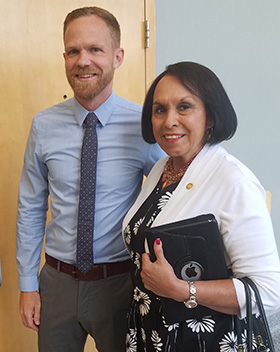Superintendents from five Kent County school districts got the chance on Tuesday to tout their school improvement initiatives, when State Superintendent Brian Whiston and the eight-member State Board of Education visited Kent ISD.
Presenting superintendents were Michael Shibler of Rockford Public Schools; Gerald Hopkins of Kenowa Hills Public Schools; Thomas Reeder of Wyoming Public Schools; William Fetterhoff of Godwin Heights Public Schools; and Kevin Polston of Godfrey-Lee Public Schools.
Each presentation included what those districts are doing around one or more of the goals of the State Department of Education’s “Top 10 in 10” initiative to make Michigan a premier education state in 10 years.
Luke Wilcox, this year’s Michigan Teacher of the Year, also took part as a representative of Kentwood Public Schools.
Kent ISD was the first stop in the state BOE’s new plan to visit two intermediate school districts each year. The board will visit Wayne RESA in February.
Here is a brief summary of the superintendents’ presentations.

Rockford Public Schools: Action Model for Success
Since 1989, Rockford has involved the community, businesses, staff and students to help shape the district’s direction and priorities, resulting in three-year strategic plans. The district is currently finalizing its Rams X report for the next three years.
Key to that level of community engagement is accountability, said Superintendent Michael Shibler.
“This is, quite frankly, the reason we are an outstanding school system,” Shibler told board members. “And it fits your plan, the fact that you need to have stakeholder input to accomplish your goals.”
He shared that if an employer tells him an employee who is a Rockford graduate doesn’t have a skill he or she should have gotten in high school, “I’ll bring that student back free of charge to get those skills.”
Wyoming Public Schools: Reading Now Network, Early Literacy and Literacy Coaching
The three components are key to district efforts to improve reading proficiency for all students. Highlighted for the board was the importance and purpose of early literacy work and literacy coaches throughout the buildings.
The district increased its reading scores through its participation in the Reading Now Network, a collaborative effort involving 100 districts to boost reading proficiency to 80 percent in 13 counties. Wyoming’s partnership with RNN also led to a $10,000 grant from the Herman Miller company, to help get more books into classrooms and create a more consistent book-leveling system.
“We all need to own that our students need to be reading much better than they are,” Superintendent Tom Reeder said.
Godwin Heights Public Schools: Fostering Shared Responsibility in School Improvement
After establishing a clear purpose and message about sharing the work of improvement, administrators and instructional coaches lead teams in highly focused learning. That begins with thoroughly understanding a district instructional goal and visiting classrooms to see it in action. Debriefing sessions within groups lead to possible steps for new improvements toward the goal.
Participants walk away with better understanding, new ways to explore meeting the goal, and a renewed sense of shared responsibility for all students to be career and college ready, said Superintendent Bill Fetterhoff.
Fetterhoff said the strategy has three elements: learning labs, where teachers observe, interact with and learn from one another; and administrators are exempt; learning walks, where administrators and instructional specialists create a consistent “lens” to support teaching staff; and school improvement, where participation is a blend of the other groups.
“So we see it in three different ways, but all the ways are there to enhance student achievement — to make our principals, our teachers, our coaches better,” Fetterhoff said. “It’s all about the learning communities and how the different cycles overlap. The greatest part about it is the feedback, and that’s been that they have confidence that we are doing this for the right reasons.”

Godfrey-Lee Public Schools: A Broader Definition of Student Success
The district’s design thinking process led to a redesign of its model of student success that addresses the needs of the whole child instead of simply providing content. This includes responding to research that indicates students need the 6Cs — communication, collaboration, creativity, critical thinking, confidence and content mastery – for success in the 21st century.
Educating the whole child also means fulfilling needs to ensure students are healthy and ready to learn, through programs like Kent School Services Network.
“First, we determine our values, and then we develop goals around those values,” Superintendent Kevin Polston told board members. “When we think about our traditional way of doing school, we’ve maxed out just about all the ways of tweaking how we’ve done that. We need to look at education through a different lens if we are going to significantly transform what we’re doing.”
Kenowa Hills Public Schools: Competency-based Learning
This paradigm-shifting approach to learning is part of a growing national trend in helping all students reach college and career readiness. In this approach, students move ahead individually as soon as they learn the material, and not together as an entire class. This allows some to move more quickly, while others get the support they need, enabling all to master the content.
The district began this shift in 2012 with K-8 mathematics, and has now implemented it districtwide. Administrators say they consistently see students who are more engaged, learning at deeper levels, and taking more ownership of their learning.
“It’s the reality of what all schools face: students who are not engaged, are not meeting the rigors and demands of school and they don’t know why,” Superintendent Gerald Hopkins said. “We don’t have all the answers, but we want to continue to learn and to keep looking for them.”
State Board members seemed to appreciate being able to meet superintendents on their own turf.
“This is the first time we’ve taken our meeting on the road,” said Eileen Lappin Weiser. “You folks are setting a horribly high standard.”
CONNECT









